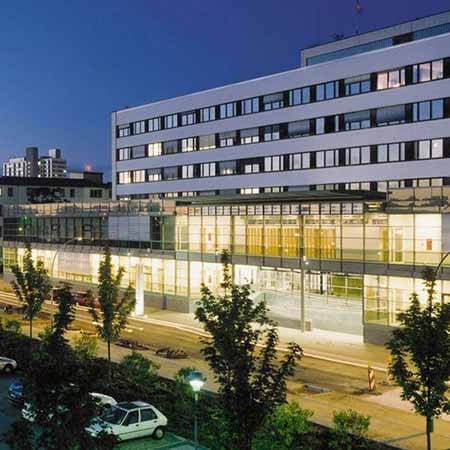Amyotrophic lateral sclerosis (ALS) is a rapidly progressive neurodegenerative disease that affects motor neurons. Modern medicine makes it possible to slow down the development of the disease, provide the patient with the opportunity to breathe and eat independently, and eliminate most of the symptoms. German doctors use drug and non-drug methods to fight against amyotrophic lateral sclerosis and stem cells to restore and protect neurons from destruction.
Content
- Drug therapy
- Symptomatic treatment
- Stem cell therapy
For the treatment of ALS in Germany, medications and physiotherapy are used. Stem cells are used in specialized clinics as an innovative method for restoring damaged spinal cord neurons.
You can undergo treatment in the following clinics: Charite University Hospital Berlin, Beta Klinik Bonn, University Hospital Ulm.
Please leave your request with an indication of the diagnosis on the Booking Health website and our patient case manager will contact you on the same day. The specialist will help you select a clinic for examination and treatment, prepare a preliminary medical care program with an estimated cost of medical services, and take care of your trip to Germany. An interpreter at the clinic will accompany you, and you can contact your coordinator via messenger at any time.
Drug therapy
Riluzole is considered the main drug for the treatment of ALS. It has a positive effect on life expectancy and motor functions. Over the past 20 years, the results of most clinical trials of other drugs have been unpromising.
Since 2017, Edaravone has been used. It is an antioxidant developed in Japan and was originally used to treat stroke. The mechanism of beneficial effects in ALS remains unknown, but clinical trials have confirmed efficiency. The drug is effective at an early stage.
Antisense ribonucleotides are considered promising in the treatment of ALS. They are injected into the liquor (cerebrospinal fluid). As of today, these drugs are used in clinical trials.
Symptomatic treatment
With ALS, it is difficult for doctors to slow the progression of the disease. It is impossible to achieve a complete cure of the pathology, and therefore the main efforts of neurologists are aimed at improving the quality of life. The following methods are considered the main treatment options:
- high-calorie foods, and in case of dysphagia (difficulty swallowing) – nutrition through a tube or gastrostomy (an opening in the anterior abdominal wall through which liquid food is injected directly into the stomach);
- physical rehabilitation;
- non-invasive ventilation with the use of a compact breathing device with a nasal or full-face mask;
- invasive mechanical ventilation through a tracheostomy (hole in the neck);
- physiotherapy, hydrotherapy and cryotherapy;
- dopaminergic drugs to eliminate spasticity;
- anticonvulsants;
- botulinum toxin injections into the parotid and submandibular salivary glands to reduce salivation;
- painkillers and antidepressants to eliminate pain.
Stem cell therapy
Neural stem cells originate from the neuroectoderm of embryos and are found in the embryonic, fetal, and mature nervous systems. They have the potential to differentiate into any cell type of the central nervous system. The ability of neural stem cells to integrate into the nervous system has already been proven. In addition to restoring lost nerve cells, they can also improve the functional treatment outcomes through auxiliary mechanisms: improving the trophic function of the nervous tissue and suppressing inflammatory reactions. Later it was discovered that neural stem cells protect motor neurons from destruction, thereby slowing the progression of ALS. After the injection of stem cells, a rapid, albeit temporary, functional improvement is achieved due to the activation of internal repair mechanisms in the spinal cord.
Mesenchymal stromal cells are easier to obtain, so they are used more often. They are usually taken from the patient's adipose tissue. Trials have shown that stem cells significantly slow down the progression of motor disorders and maintain the number of motor neurons. In addition, mesenchymal stem cells increase the levels of glial cell-derived neurotrophic factor (GDNF) and basic fibroblast growth factor (bFGF) in the spinal cord, providing nervous tissue trophic function, repair and protection. Stem cells can deliver neurotrophic, anti-inflammatory, and immunomodulatory molecules to the nervous system and are therefore considered a promising treatment for ALS.
Embryonic and induced pluripotent stem cells can also be used in neurology.
To date, cell therapy is not part of the standard treatment for ALS. It is used in clinical trials. The first trial started in 2009, and it continues today. Given the encouraging results, some German clinics are already offering cell therapy to their patients.
If you want to undergo diagnostics and treatment of amyotrophic lateral sclerosis in Germany, you are welcome to visit the Booking Health website. Here you will find information about specialized clinics and real prices for diagnostics and treatment. The total cost of treatment will be decreased due to the lack of additional coefficients for foreign patients. On the Booking Health website, you can find the price of drug therapy, stem cell therapy and rehabilitation in different clinics in Germany. Please leave your request on our website, and the Booking Health specialists will select the best clinic to treat your neurological disease.
Authors:
The article was edited by medical experts, board certified doctors Dr. Nadezhda Ivanisova and Dr. Sergey Pashchenko. For the treatment of the conditions referred to in the article, you must consult a doctor; the information in the article is not intended for self-medication!
Sources:
European Academy of Neurology
Journal of Neurology, Neurosurgery and Psychiatry
Centers for Disease Control and Prevention














